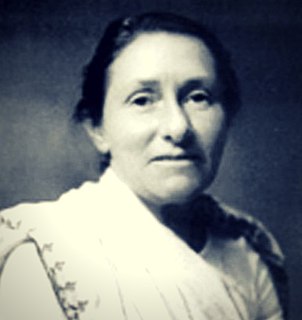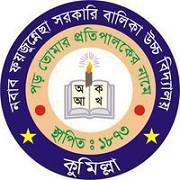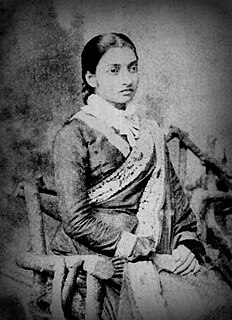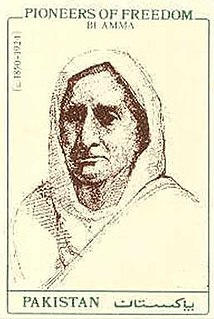
Bethune College is a women's college located on Bidhan Sarani in Kolkata, India, and affiliated to the University of Calcutta. It is the oldest women's college in India. It was established as a girls' school in 1849, and as a college in 1879.

Jhalkaribai was a woman soldier who played an important role in the Indian Rebellion of 1857. She served in the women's army of Rani Lakshmibai of Jhansi. She eventually rose to a position of a prominent advisor to the queen, Rani of Jhansi. At the height of the Siege of Jhansi, she disguised herself as the queen and fought on her behalf, on the front, allowing the queen to escape safely out of the fort.

Mrinal Pande is an Indian television personality, journalist and author, and until 2009 chief editor of Hindi daily Hindustan.

Sarala Devi Chaudhurani was an educationist and political activist, who founded Bharat Stree Mahamandal in Allahabad in 1910. This was the first women's organization in India. One of the primary goals of the organization was to promote female education. The organization opened several offices in Lahore, Allahabad, Delhi, Karachi, Amritsar, Hyderabad, Kanpur, Bankura, Hazaribagh, Midnapur, and Kolkata to improve the situation of women all over India.

Sarala Devi was an Indian independence activist, feminist, social activist, politician and writer. She was the first Odia woman to join the Non-cooperation movement in 1921 and the first Odia woman delegate of the Indian National Congress. She became the first woman to be elected to the Odisha Legislative Assembly on 1 April 1936. She was also the first female Speaker of the Odisha Legislative Assembly, the first woman Director of Cuttack Co-operative Bank, and the first female Senate member of Utkal University. She was the only representative from Odisha on President Dr S. Radhakrishnan's Education Commission.
Devi Chaudhurani is a Bengali novel written by Bankim Chandra Chatterjee and published in 1884. It was later translated to English by Subodh Chunder Mitter. Following closely after Anandamath, Bankim Chandra renewed call for a resurgent India that fights against oppression of the British Empire with strength from within the common people, based on traditional Indian values of austerity, dedication and selflessness. It is another important novel in the history of Bengali and Indian literature. Since it fuelled the patriotic struggle for Indian independence from the British Empire, the novel was banned by the British. The ban was lifted later by the government of India after independence. In this novel, Bankim Chandra reinforced his belief that armed face-to-face conflict with the Royal Army is the only way to win independence.

Suniti DeviCIE (1864–1932) was the Maharani of Princely state of Coochbehar, India.
Maharani Girls High School is a Higher Secondary school for girls located at Darjeeling, West Bengal, India.

Sarala Behn was an English Gandhian social activist whose work in the Kumaon region of India helped create awareness about the environmental destruction in the Himalayan forests of the state. She played a key role in the evolution of the Chipko Movement and influenced a number of Gandhian environmentalists in India including Chandi Prasad Bhatt, Bimala behn and Sunderlal Bahuguna. Along with Mirabehn, she is known as one of Mahatma Gandhi's two English daughters. The two women's work in Garhwal and Kumaon, respectively, played a key role in bringing focus on issues of environmental degradation and conservation in independent India.

Nawab Faizunnesa Government Girls' High School is a girls' school in Comilla, Bangladesh, established in 1873 by Faizunnesa Choudhurani, who would in 1889 be titled India's only female nawab by Queen Victoria. Faizunnesa, a wealthy zamindar, established Faizunnesa Girls' Pilot High School, having noted the need for female education which would accommodate Muslim girls practising purdah. The school taught its children in the local Bengali language rather than Urdu or Persian which were the standard languages of education at the time. The students also learned English. During the early years of its establishment, it was treated as the English medium school for girls. It was converted to a junior high school in 1889, and to a high school in 1931.
Prabhat Nalini Das was an Indian public intellectual, academic and university president. She served as a professor of English and head of the English Department at Lady Shri Ram College, Delhi University; Indian Institute of Technology, Kanpur; Utkal University and Ranchi University. She was the first Director/Dean of the Humanities Division at the Indian Institute of Technology, Kanpur; Founder-Professor and Head of the Department of English at Utkal University for almost 19 years, and Chairman of Utkal University's Post Graduate Council; and the Pro-Vice-Chancellor of North Eastern Hill University, a Central University established by an act of the Parliament of India, with independent charge of its Kohima, Nagaland campus.

Jnanadanandini Tagore was a social reformer who pioneered various cultural innovations and influenced the earliest phase of women's empowerment in 19th century Bengal. She was married to Satyendranath Tagore, Rabindranath Tagore's elder brother. The Tagores are a scion of the Jorasanko Tagore Family.
Basanti Devi was an Indian independence activist during the British rule in India. She was the wife of activist Chittaranjan Das. After Das' arrest in 1921 and death in 1925, she took an active part in various political and social movements and continued with social work post-independence. She was awarded the Padma Vibhushan in 1973.
Chowdhury is a title of honour, usually hereditary, originating from the Indian subcontinent. It is an adaption from Sanskrit. During the Mughal rule, it was a title awarded to eminent people, while during British rule, the term was associated with zamindars and social leaders. The common female equivalent was Chowdhurani. Many landlords under the Permanent Settlement carried this surname. Land reforms after the partition of India abolished the permanent settlement. In modern times, the term is a common South Asian surname for both males and females.

Indira Devi Chaudhurani was an Indian literary figure, author and musician. Born to the Tagore family, Indira was the younger child of Satyendranath Tagore and Jnanadanandini Devi and younger sister of Surendranath Tagore. She is noted for her work in scoring the music for a number of songs by her uncle Rabindranath, with whom she was particularly close. Indira Devi Chaudhurani died in 1960.

Abadi Bano Begum was a prominent voice in the Indian independence movement. She was also known as Bi Amman. She was one of the first Muslim women to actively take part in politics and was part of the movement to free India from the British Raj.

Pragyasundari Devi, also seen as Pragyasundari Debi, Pragya Sundari Devi, Pragasundari Debi, or Prajnasundari Bezbaroa, was an Indian cookbook author and magazine editor. Her Amish O Niramish Ahar was a "significant" early cookbook in the Bengali language.
The Ahmadi was a historic fortnightly magazine published in Tangail.











